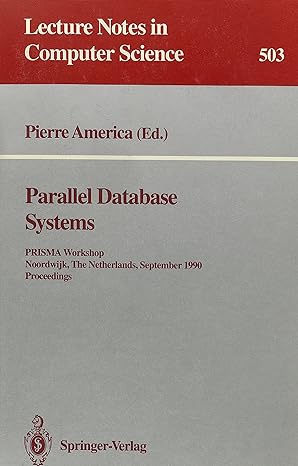Answered step by step
Verified Expert Solution
Question
1 Approved Answer
Decision Support Systems Exam 2 - Part 1 Q1. Dynamic models take a single snapshot, where everything occurs in a single interval. a. true b.
| Decision Support Systems Exam 2 - Part 1 |
| Q1. Dynamic models take a single snapshot, where everything occurs in a single interval. a. true b. false Q2. Long-range planning would be considered to be a ________ model. a. dynamic b. static c. mathematical d. multidimensional e. simulation Q3. Linear programming involves experimenting on a model of a system. a. true b. false Q4. Simulation involves experimenting on a model of a system. a. true b. false Q5. Which model is designed to find the best solution from a large number of possible alternatives using a step-by-step process? a. Decision trees b. Markov analysis c. Linear programming d. Heuristic programming e. Simulation Q6. The types of decision-making situations that may require analysis (in order of increasing complexity) are certainty, risk, and uncertainty. a. true b. false Q7. The technique of Mathematical programming can be classified as: a. simulation. b. heuristics. c. optimization. d. optimization subject to constraints. e. enumeration. Q8. A DSS is designed to determine what will be; an MIS is designed to report what was. a. true b. false Q9. A blind search is designed to support individual decision-makers with sight impairment. a. true b. false Q10. Influence diagrams can be constructed with varying degrees of detail. a. true b. false Q11. There are many different types of models, but an individual DSS can consist of only one. a. true b. false Q12. Which model is designed to predict the future for a given scenario? a. Decision trees b. Markov analysis c. Linear programming d. Heuristic programming e. Simulation Q13. Decision trees are capable of handling multiple-goal problems. a. true b. false Q14. The decision-maker's attitude toward risk can change the outcome of a situation involving risk. a. true b. false Q15. Expected values are computed by multiplying: a. the largest expected results by their probability. b. all results by their probabilities, then summing them up. c. all results by their probabilities, then selecting the best. d. all probabilities by their expected results. e. all expected results by their probabilities. Q16. Business dashboards provide real-time views of data a. true b. false Q17. An object-oriented database management system allows you to analyze data at a conceptual level that emphasizes the natural relationships between objects. a. true b. false Q18. Data mining must use statistics to analyze data. a. true b. false Q19. XML will help future data integration projects because of its ability to overcome poor business logic. a. true b. false Q20. Knowledge consists of data items and/or information organized and processed to convey understanding, experience, accumulated learning, and expertise as they apply to a current problem or activity. a. true b. false Q21. Data quality is important because it can affect the quality of organizational decisions. a. true b. false Q22. The two most common data warehouse architectures are three-tiered and four-tiered. a. true b. false Q23. Data, information, and knowledge are essentially the same thing. a. true b. false Q24. In a data warehouse, data are organized by: a. time. b. subject. c. source system. d. degree of volatility. e. size. Q25. Intrinsic data quality refers to the ease of understanding or interpretability of data. a. true b. false |
Step by Step Solution
There are 3 Steps involved in it
Step: 1

Get Instant Access to Expert-Tailored Solutions
See step-by-step solutions with expert insights and AI powered tools for academic success
Step: 2

Step: 3

Ace Your Homework with AI
Get the answers you need in no time with our AI-driven, step-by-step assistance
Get Started


